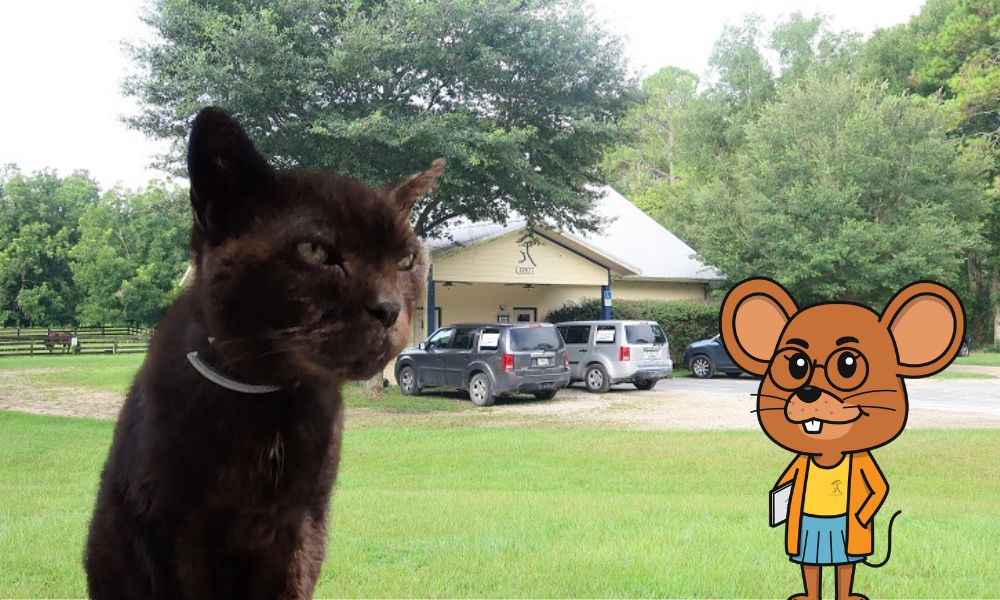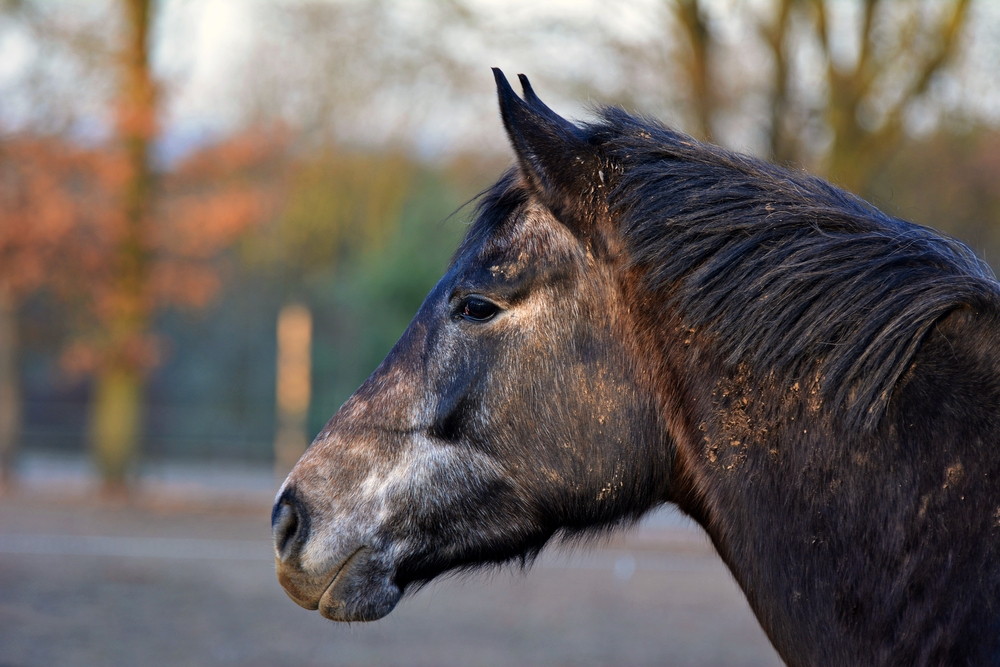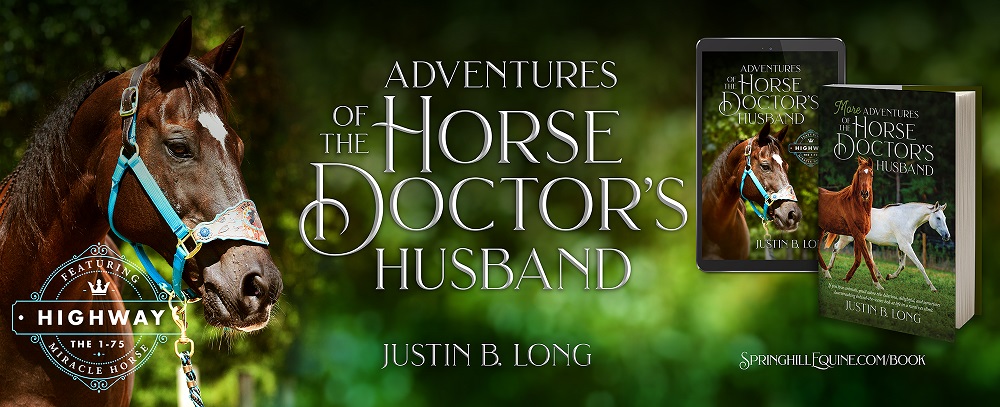Tuesdays with Tony
There comes a time in every cat’s life where he hangs up his author hat and takes on a more… advisory role. While I very much enjoy imparting my cat wisdoms to you lowly humans, which I’ve been doing since 2011, I’m finding it more enjoyable to soak up sunshine out on the porch in my old age. So, it’s time to announce that this will be my last blog. Now don’t you worry, I wouldn’t leave you humans without continued teachings. I’d like to introduce Whinnifred—Whinny for short. And she is short. This little field mouse is a longtime friend of mine and I’ve been instructing her in the ways of communicating with the lesser species… you.
Before you start to question my feline ferocity, let me remind you that I could very well choose to catch my meals, but why would I, when my staff will do it for me? So, I can remain friends with the other animal brethren that frequent the grounds around Springhill Equine. Hence, Whinny. She’ll have a new blog title (it can’t very well stay Tuesdays with Tony when I’m not writing it). Her blog title will be Whinny’s Wisdoms. And as long as you’re subscribed to my blog, you’ll be subscribed to hers. You are subscribed, right?

Retiring Horses
I figured since I’ve announced my own retirement in this blog, it’s only appropriate to talk about equine retirement today. Lots of horses never have jobs. They’re what we call “pasture ornaments,” and there is no shame in that game, coming from a soon-to-be self-proclaimed clinic ornament. But many horses start out with a job where they run, or jump, or do ballet, all for their humans (do you realize what a gift that is?) and eventually retire to life in a pasture. Some horses even leave a job like that to start teaching small humans how to ride and be around horses. That’s probably the most prestigious horse job of all, if you ask me, but I’m still relieved that cats don’t do that stuff.
Let’s talk about the care and management of a retired horse. This could be an old or a young horse – many retire because of age, but some are forced to because of an injury or other issue that prevents them being an athlete. However, this doesn’t stop them being a wonderful companion.
I’ll make one point very clear at the start: retired horses still need regular vet care. They still need exams, vaccines, farrier work, and at least yearly (if not twice yearly) dentals. Many will need long term medication to manage arthritis, Cushings, or other ailments that you should talk to my docs about.
Many times, my docs will recommend additional yearly things for our retired horse population, things like yearly blood work, or screening radiographs of the feet to try to catch disease early. I hear them say over and over again: age is not a disease, but it can bring diseases with it.
Making the Transition
Retiring a horse usually means they go from being ridden regularly, whether that’s daily or a few times a week, to not really being ridden at all anymore, except for maybe the occasional trail ride or bareback hack. For some horses, this is easy and welcomed; for others, they take the lack of work as a lack of purpose and attention and can have some opinions about it. If your horse begins acting aggressive or nervous following retirement, that’s a good indication they need a part-time retirement gig.
What’s important, when going from riding a horse regularly to not riding, is that you humans don’t suddenly start ignoring them. Just because they’re no longer carrying you around doesn’t mean they’re any less important. Just ask my humans: they love me just as much whether I’m an author or a retiree, and they are still going to cater to my whims each day (mostly opening the door repeatedly and scratching under my chin on demand). My point here is you should try to spend time with your retired horses just like you do your working horses. This can still involve training—my docs love talking to people about clicker training!—or can involve simple things like grazing, baths, and grooming.
In or Out?
In general, retired horses do best if they can be turned out for as much time as possible. It goes without saying that if my docs give you a different plan for a specific horse, listen to them. But especially when horses are retired for arthritis or old age changes, gentle movement is really helpful in keeping their joints lubricated.
Most horses have a routine when they’re in work; retired horses would often like a set routine as well. So even if they’re out in the field, if you make a point to feed or bring them in at the same time every day, that will help keep them happy.
Diet
Remember that your horse likely doesn’t need the same diet as a retiree that they did while in active work. The specific changes you make are going to be very dependent on what ailments your horse is experiencing and why they were retired, but this is a conversation to have with my docs or an equine nutritionist.

In general, a retired horse that’s not in work won’t need as much energy or simple carbohydrates (read: grain/concentrate) as they did while they were in work. And it’s a continued conversation. It may be that the initial changes you make to the diet don’t stay consistent after your horse is retired for 2-3 years. Remember, any diet changes should always be done gradually.
Location, Location, Location
Let’s briefly get on a litter box (I hate soap). My humans and I all understand that everyone’s lives are different and sometimes unexpected situations come up, but we’d all urge you to remember just how much work your horses put in for you before they were retired. Horses—and all animals—are lifelong commitments, and if there’s a way for you to ensure a really great retirement for your companions, you should do it.
Most often the surest way to ensure that is to maintain ownership of them and retire them on your property, but there are often also options to send them to a trusted friend or family member’s home where you can still be kept in the loop of their health and happiness. What this cat wants you to avoid is taking your retiring horses to a random auction or just selling them to the highest bidder on the Face Place. Those are really risky endeavors and more often than not they put your retired horses in bad places.
Creating New Habits
Mostly, your retired horse is still a horse. As far as general care, they need a lot of the same things they used to. You can try to prevent problems by staying on top of looking at them every day or as often as you can. This is especially true for eyes and underbellies. Both of these areas can get issues—things like eye ulcers or cancer—but when horses aren’t tacked up every day, they may not get attention in those spots. If your pasture ornament wears a fly mask or any blankets regularly, they must be removed, and the underlying skin or eyes inspected every single day.
Shifting Goals
My docs always preach about having a great relationship with your veterinarian, and when you have a retired horse, it’s even more important. The goals of their care adjust from performance-type elements to being solely focused on quality of life. Your veterinarian can help you determine how to objectively monitor quality of life so that you can plan for the future.
I can’t wait for my quality of life to improve as I no longer have to grind away on this keyboard. My toe beans are slowing down, and Whinny has become pretty adept at scurrying across the keys, so I know she’s ready to take on the job. I’ll admit it’s been a pleasure instructing you humans all these years. Remember, cats are always right, and this cat is going to continue to be right…. right over there laying in the sun!
Farewell,
Tony
P.S. Have you been keeping up with the new videos over on my YouTube Channel? There’s a new series called Horse Girl Goes to the Vet that is hilarious, and you don’t want to miss out on that. There have also been some really good seminars recently, including one on wound care that you definitely want to check out. If you’re subscribed to the YouTube Channel, you should get a notification when a new video comes out, so make sure you do that. Okay, now I’m done, off to my favorite nap spot.
Tuesdays with Tony is the official blog of Tony the Clinic Cat at Springhill Equine Veterinary Clinic in Newberry, Florida. If you liked this blog, please subscribe below, and share it with your friends on social media! For more information, please call us at (352) 472-1620, visit our website at SpringhillEquine.com, or follow us on Facebook!
[jetpack_subscription_form title="Subscribe to Whinny's Wisdoms"]

